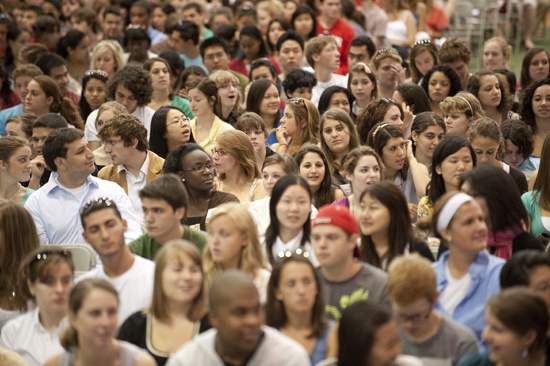What Makes the Class of 2014?
Students are diverse and competitive

When Eda Aslanoba arrives at Boston University in September, she’ll be thousands of miles away from her family in Bursa, Turkey. But Aslanoba isn’t nervous. “I’ve chosen to be an individual in the world instead of a little girl in my hometown,” she says. “I take my steps confidently.”
An only child, Aslanoba (ENG’14) acknowledges that leaving her parents will be difficult. But she’s known for years that she would study abroad, so her apprehension has had time to settle into conviction. “Although there are great schools in Turkey,” she says, “they can’t give me the academic opportunities I’m seeking.”
Aslanoba, who plans to study mechanical engineering with a concentration in aerospace engineering, is one of 38,250 students who applied to BU’s Class of 2014 — the most in BU history and a 1.2 percent increase over last year.
Kelly Walter, executive director of admissions, says the University admitted approximately half of the applicant pool, and officials predict that about 4,100 students will accept its offer. “Our competition is keen,” says Walter. “Students who apply to BU also tend to apply to Ivy League and other top-tier institutions.”
This is first time the University has invited members of the incoming freshman class to enroll in the new University Honors College, designed to include cross-disciplinary classes, intensive seminars, and independent studies for seniors.
“We selected just over 300 students for the program,” Walter says. “Our hope is to enroll approximately 50 freshmen this fall.” Selected students were in the top 3 percent of their class, had an A average, and an average SAT score of 2171.
Walter is particularly excited about this year’s applicants, because of their “rich, diverse” experiences. “We have students applying from all walks of life,” she says. “They’ve contributed hundreds of hours of community service all over the world. One young woman went to Africa to build huts in a Tanzanian village. One student sang for Pope Benedict XVI, another had an internship with Katie Couric.”
While test scores and GPAs are considered during the review process, Walter says the admissions office takes a more holistic approach to establish which students it will accept. “We ask whether we’re confident the student will be successful academically,” she says, “and we ask how the student will contribute to or enrich the BU community.”
Reviewers begin by looking at high school records. “We look at the totality of their record: rigor of courses, trends in records, test scores,” Walter says. “Advanced Placement courses are generally a good predictor of how well students will do here.”
Writing samples are also a major factor. “Open-ended essay questions give applicants an opportunity to use their own voice,” she says, “and share what makes them special.
“We want to see how they spend their time out of the classroom,” she continues. “Are they three-sport athletes? Are they editor of their high school newspaper? What are their passions, and will they bring them to the BU community?”
Aslanoba says she will bring hers. “Even though I’m studying engineering, I have many hobbies and passions,” she says. “I play the piano and the cello; I play sports.”
She is particularly excited about joining an intramural sports club. “I’ll join some science and engineering organizations, of course,” she says, “but I’d really like to get involved in a golf or rowing club.”
International applications continue to rise, with 4,892 applications, a 16 percent increase from last year. Students from more than 144 countries applied, the majority from China, India, Korea, Canada, and Taiwan. Domestically, students applied from all 50 states.
Another area that saw an increase was applications among underrepresented minority students; in particular, applications from African-American students increased by 15.7 percent.
Female applicants account for 58.7 percent of the total, a 1 percent decrease from last year. The applicants’ average composite SAT score was 1874, 2 points higher than last year. The average high school GPA was 3.4, and the average class rank was in the top 16 percent.
Students accepted to BU’s class of 2014 had an average class rank in the top 11 percent, an average GPA of 3.6, and a composite SAT score of 1967.
Comments & Discussion
Boston University moderates comments to facilitate an informed, substantive, civil conversation. Abusive, profane, self-promotional, misleading, incoherent or off-topic comments will be rejected. Moderators are staffed during regular business hours (EST) and can only accept comments written in English. Statistics or facts must include a citation or a link to the citation.